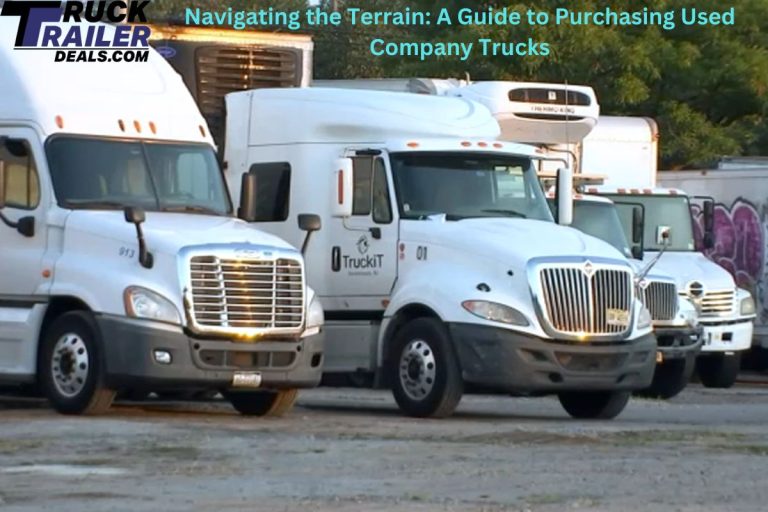
In today’s dynamic business landscape, the acquisition of used company trucks presents an appealing option for businesses aiming to optimize their operational efficiency while managing costs. Whether you’re a startup looking to establish your fleet or a seasoned enterprise seeking to expand, the decision to invest in used company trucks requires careful consideration. This guide aims to equip you with essential insights and considerations to streamline your purchasing process.
Points to Consider When Purchasing Used Company Trucks:
- Define Your Needs: Begin by assessing your company’s requirements. Consider factors such as payload capacity, vehicle size, fuel efficiency, and intended usage. Understanding your specific needs will help narrow down the options and ensure you select trucks that align with your operational demands.
- Budget Allocation: Establish a realistic budget for acquiring used company trucks. Factor in not only the purchase price but also ongoing maintenance costs, insurance expenses, and potential upgrades or modifications. Balancing affordability with quality is crucial to making a cost-effective investment.
- Vehicle History and Condition: Conduct thorough research on the history and condition of the trucks you’re considering. Request maintenance records, inspection reports, and vehicle history reports to gain insight into the truck’s past performance and any potential issues. Additionally, inspect the trucks in person or enlist the help of a trusted mechanic to assess their mechanical condition.
- Consider the Source: Evaluate the credibility and reputation of the seller or dealership offering the used trucks. Opt for reputable sellers with a track record of providing reliable vehicles and transparent transaction processes. Additionally, explore various sources such as online marketplaces, auctions, and certified pre-owned programs to access a diverse selection of used company trucks.
- Test Drive and Evaluation: Prioritize test driving the trucks to gauge their performance firsthand. Pay attention to factors like engine responsiveness, braking efficiency, handling, and overall driving experience. Use this opportunity to identify any potential issues or areas that may require attention.
- Warranty and After-Sales Support: Inquire about available warranties and after-sales support options for the used trucks. While older vehicles may have limited warranty coverage, some sellers offer extended warranties or service contracts to provide added peace of mind. Clarify the extent of coverage and any terms and conditions associated with the warranty.
- Customization Potential: Assess the customization potential of the used company trucks to ensure they can be tailored to meet your specific requirements. Consider factors such as aftermarket accessories, fitting capabilities, and compatibility with specialized equipment or technology enhancements. Choosing trucks that offer flexibility for customization can enhance their utility and longevity within your fleet.
- Sustainability and Compliance: Evaluate the environmental impact and regulatory compliance of the used trucks. Look for models with fuel-efficient engines and emissions-reducing technologies to minimize your carbon footprint and adhere to environmental regulations. Additionally, ensure that the trucks meet all relevant safety standards and compliance requirements applicable to your industry and region.
Frequently Asked Questions (FAQs) About Purchasing Used Company Trucks:
1. Are used company trucks a reliable investment?
- Used company trucks can be a reliable investment when purchased thoughtfully. Conducting thorough research, inspecting vehicle history, and prioritizing maintenance can help mitigate risks and ensure the reliability of the trucks.
2. How do I determine the fair market value of used company trucks?
- Factors such as the vehicle’s age, mileage, condition, and market demand influence its fair market value. Utilize online resources, industry guides, and professional appraisal services to assess the value of used trucks accurately.
3. What are the advantages of purchasing certified pre-owned (CPO) company trucks?
- Certified pre-owned company trucks undergo rigorous inspections and refurbishments to meet manufacturer standards, offering enhanced reliability and warranty coverage compared to standard used vehicles. CPO programs provide added assurance of quality and peace of mind for buyers.
4. How can I finance the purchase of used company trucks?
- Financing options for used company trucks may include bank loans, dealership financing, leasing arrangements, or specialized commercial vehicle lenders. Compare interest rates, terms, and repayment options to select the most suitable financing solution for your business.
5. What steps should I take to maintain and prolong the lifespan of used company trucks?
- Implementing a comprehensive maintenance schedule, conducting regular inspections, addressing issues promptly, and investing in driver training can help maintain the performance and longevity of used company trucks. Additionally, prioritize preventive maintenance and utilize genuine OEM parts to optimize vehicle reliability and resale value.
6. Can I customize used company trucks to suit my business needs?
- Yes, many used company trucks offer customization potential to accommodate specific business requirements. Explore aftermarket accessories, fitting options, and specialized equipment installations to tailor the trucks to your operational needs effectively.
7. How do I ensure compliance with regulatory standards when purchasing used company trucks?
- Research applicable safety, environmental, and compliance regulations governing commercial vehicles in your region. Verify that the used trucks meet these standards and obtain necessary certifications or inspections to ensure compliance with legal requirements.
By leveraging these insights and addressing common concerns, businesses can navigate the process of purchasing used company trucks with confidence. With strategic planning, thorough evaluation, and informed decision-making, companies can acquire reliable vehicles that support their operational objectives and contribute to long-term success.